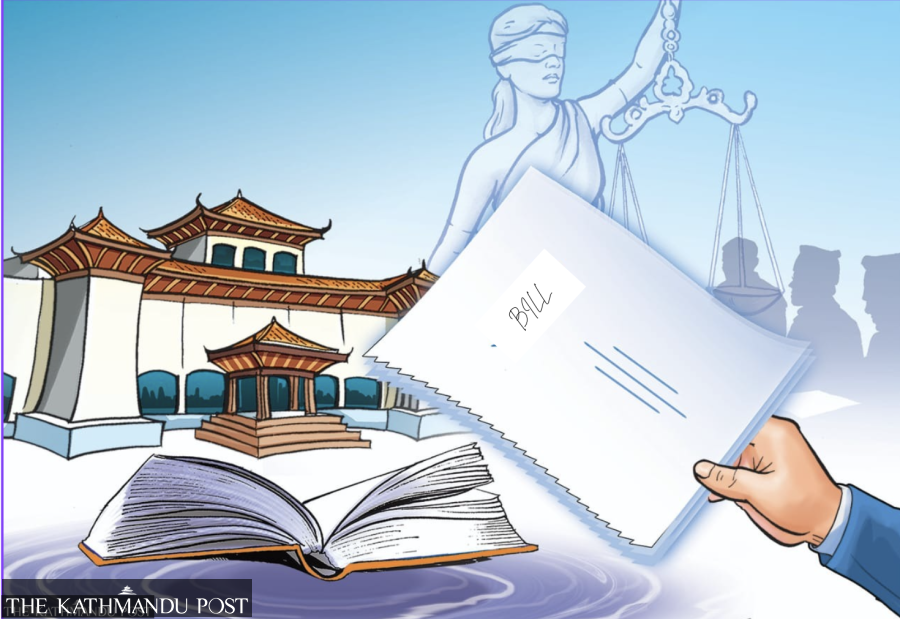National
Pressure groups are dictating lawmaking
From doctors to teachers to police, powerful lobbies are bending laws to serve their interests.
Binod Ghimire
On July 8, following protests by the Nepal Medical Association, the government struck a deal with the medical doctors to make “necessary revisions” to the Consumer Act. The doctors had launched an agitation, closing all services except emergencies, against Consumer Court’s verdicts to slap penalties on doctors found guilty of gross negligence in treatments that even led to patient deaths.
In recent verdicts, the court imposed heavy penalties on three private hospitals—Rs5.68 million on the Chabahil-based Om Hospital; Rs5.7 million on Grande City Clinic (Rs4 million on the doctors and Rs1.7 million on hospital); and Rs14.5 million on Himal Hospital (70 percent on the doctor and 30 percent on hospital).
Since the Act provided the legal basis for the penalties, the doctors took to the streets demanding revision. Yielding to their pressure, the government constituted a three-member panel with the responsibility to get the Cabinet’s approval to press ahead with the amendment process.
The committee comprising a joint secretary each from the Ministry of Health and Population; Ministry of Industry, Commerce and Supplies; and Ministry of Law Justice and Parliamentary Affairs, has until July 19 to get Cabinet’s approval after sorting out which provisions in the Act need to be revised in favour of the doctors.
Cabinet approval is a must before drafting an amendment bill of any Act.
In principle, the executive drafts bills when necessary, while the legislature has the authority to endorse, approve or reject it. However, in this case, the Act is being revised under the pressure of an interest group—the doctors.
This is not the first time doctors have compelled the government and the legislature to revise law in their favour. In 2018, following their pressure, section 232 of the criminal code was amended just months after it came into force.
The doctors are not an exception when it comes to forcing the executive or the sovereign parliament to act in their interest. Only last month, the Gandaki province, under pressure from public transport operators, had to halt the implementation of a ride-hailing policy. (However, the top court has already given its green signal for the policy’s implementation.)
Likewise, the bill to amend the Nepal Police Act, necessary to integrate the police force in provincial police, has not moved ahead as the police force is unhappy with some of its provisions. Separately, one big reason the School Education Bill has not been endorsed is because the Nepal Teachers’ Federation has been lobbying for incorporating provisions in its interest.
Experts who have followed these developments say this is an intrusion into the legislature’s authority. “The influence of interest groups that can override the lawmaking process constitutes an attack on the legislative authority of parliament,” senior advocate Radheshyam Adhikari, who also is a former lawmaker, told the Post. “The current political authority succumbs to pressure as it lacks the moral strength to resist.”
He says having authority alone is not enough, one also needs to stand on sound moral ground to exercise it.
It is natural to give in to pressure from interest groups when those in authority do not trust themselves. When leadership is weak, interest groups take advantage, according to the experts.
Parliamentary democracy is effective when the parliament is independent in its legislative functions. But that is often not the case in Nepal. The recent incident of tampering with a sub-clause of the Federal Civil Service Bill after it had already been endorsed by a parliamentary committee is also a poor testament to the legislative’s functioning. The controversy erupted when the lower house passed the manipulated bill without reading or understanding it, and the tampering was discovered afterwards.
Ganesh Datta Bhatta, former associate professor at Nepal Law Campus, says it is natural for different groups to lobby in their interest. “However, it is the responsibility of the executive [government] to deal with it effectively. How can the rule of law be maintained if you keep revising or formulating laws based on pressure rather than need?” he said.
Bhatta also sees a problem in the lawmaking process that is contributing to a rise in the influence of pressure groups. “Our laws are prepared without proper consultations, leaving stakeholders out of the loop. It is natural for the stakeholders to exert pressure when they are excluded from the entire process,” he said. “Each law should be prepared only after intense discussions. But once enacted, the government must be bold enough to implement it in both letter and spirit.”




 9.7°C Kathmandu
9.7°C Kathmandu














